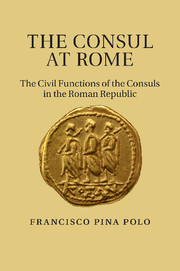Book contents
- Frontmatter
- Contents
- List of illustrations
- Acknowledgements
- Introduction
- PART I THE CONSULAR FUNCTIONS IN THE PRE-SULLAN AGE (367–81)
- 1 The consuls taking office
- 2 Consuls and civic religion
- 3 Consuls, the agents of diplomacy in the Roman state
- 4 Communication between the consuls and the people: edicts and contiones
- 5 Consuls as legislators
- 6 The jurisdiction of the consuls
- 7 Consuls as promoters of public works
- 8 Colonization and distribution of land
- 9 Appointment of a dictator
- 10 Consuls presiding over elections
- 11 The consular year in the pre-Sullan age
- PART II THE CONSULAR FUNCTIONS IN THE POST-SULLAN AGE (80–50)
- 15 Conclusion
- Bibliography
- Index of Subjects
- Index of Ancient Sources
- Index of Ancient Personal Names
3 - Consuls, the agents of diplomacy in the Roman state
Published online by Cambridge University Press: 25 October 2011
- Frontmatter
- Contents
- List of illustrations
- Acknowledgements
- Introduction
- PART I THE CONSULAR FUNCTIONS IN THE PRE-SULLAN AGE (367–81)
- 1 The consuls taking office
- 2 Consuls and civic religion
- 3 Consuls, the agents of diplomacy in the Roman state
- 4 Communication between the consuls and the people: edicts and contiones
- 5 Consuls as legislators
- 6 The jurisdiction of the consuls
- 7 Consuls as promoters of public works
- 8 Colonization and distribution of land
- 9 Appointment of a dictator
- 10 Consuls presiding over elections
- 11 The consular year in the pre-Sullan age
- PART II THE CONSULAR FUNCTIONS IN THE POST-SULLAN AGE (80–50)
- 15 Conclusion
- Bibliography
- Index of Subjects
- Index of Ancient Sources
- Index of Ancient Personal Names
Summary
In Republican Rome permanent diplomatic representation between states did not exist. Relations were occasional and temporary, depending on changing political circumstances. As a result, there were no ‘diplomats’ in the modern sense, nor experts in diplomacy. In Rome, it was understood that anyone wanting a political career, and therefore any senator, ought to have a sufficient knowledge of external affairs and should have an understanding of treaties, alliances, and international law in general.
The diplomatic relations of the Roman state were thus in the hands of the magistrates and the senate. In the list of civil functions assigned to consuls in Rome before they took command of their armies, Polybius alludes to the bringing of foreign embassies before the senate. According to the Greek author, the senate was in charge of sending legates to non-Italic states as well as deciding on the response to be given to foreign ambassadors and the treatment they ought to receive in each particular case. Consequently, it is clear that the senate had total control over diplomacy in the city of Rome and that only senators could receive embassies and appoint official legates, but also that when dealing with representatives of other states, the consuls acted as the agents in the diplomatic process.
Indeed, ancient sources frequently refer to the consuls acting on behalf of the Roman state in negotiations with representatives of other states, both in Rome and during the wars in which they were involved.
- Type
- Chapter
- Information
- The Consul at RomeThe Civil Functions of the Consuls in the Roman Republic, pp. 58 - 82Publisher: Cambridge University PressPrint publication year: 2011



